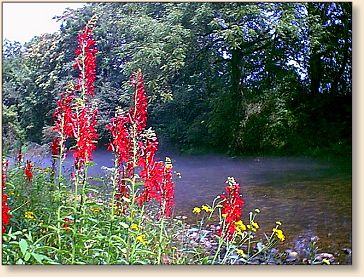|
Decided to try the Smith River in Henry County, VA on
a rather warm July day last year. Pulled into the small
parking area next to the Bassett, VA "Mirror Plant" at
the upper end of the three mile special reg's. area and
was surprised to find no other vehicles in the area.
Started the long walk down the railroad tracks, that
parallel the river, and turned into the woods just before
the low trestle for the short walk to the river bank.
Even in July, one does not consider wading without some
protection against the cold tail water releases from
Philpot Dam, a short distance upstream. On this
particular morning, the warm air combined with the
cold water to produce a low laying fog all along
the river that limited visibility to less then twenty
to thirty yards for the first few hours. If that wasn't
handicap enough, while wearing glasses, you couldn't
fish more then a few minutes without a thick "fog" also
obscuring your vision.

Never having fished this section before, I decided to
fish upstream with the hope of reaching the "Mirror Plant"
by lunch time. To even further handicap the hapless rookie,
we were in the third or fourth year of a sustained drought
that had brought water levels to dangerous low on all the
waterways, even those sustained by regular releases from
the dams.
In spite of the conditions, it was a beautiful day and
the fog started to dissipate in short order. However,
before very much of had it burned off, the sounds of
a pretty substantial gaggle of Canada geese could be
heard upstream just out of sight in the still lingering
fog. Occasionally, feathers could be seen drifting slowly
past me, while the cacophony upstream continued.
At this point, the "catching" part hadn't caught up
with the fishing; so, I eased quietly upstream hoping
to get within a respectable distance of the big birds
with the hope that my ever present digital camera might
be suitable to capturing a shot or two of the birds.
Slowly working up through the shallow water was soon
rewarded with my first glimpse of the noisy "gaggle"
just resting in a small off-shoot of the main river;
preening and noisily communicating. I suspect they
were conversing as to just what that shrouded apparition
was that was closing in on them and "honking" back at
them from time to time! Later retrospectives about
the incident led to the belief that a video of this
performance would have had no trouble qualifying for
"America's Funniest Home Video's" or better still;
Letterman's Stupid Pet Tricks.
The birds didn't seem too upset as I moved slowly
ahead, digital camera at the ready, and I was able
to close to about seven yards of the nearest Canada.
They slowly started to split into two groups, with
one paddling out to the main stream and the inlet
group backing further into cover. At this point it
appeared that one of the birds had gotten some
yellow plastic caught around it's neck and it looked
to be quite tightly wound into position. Fearing the
worst, a few steps brought me close enough to make
out a letter and numbers on the band around the birds
neck. It was definitely an "A15" in block black on
the yellow plastic.

I started snapping pictures at this point and the
riverside birds decided it was a good time to take
flight. A small group of about seven birds flew
straight at me as I frantically snapped and ducked
(pun intended) at the same time. Unfortunately, my
then camera was not equipped with a zoom lens and
the band on the birds neck couldn't be documented.

The rest of the day was uneventful and several more
photos were taken of the beautiful surroundings; fog
on the river, brilliant red scarlet sage on the banks
and a few butterflies testing some nectar.
But; the thought of the bird with the plastic around
it's neck was still distressing; so, that evening I
sat down at the computer and searched for a U.S.
Wildlife site that might have information on possible
bird banding by the use of yellow plastic around the
neck as opposed to a leg band.
I found two sites that might help, one Canadian and one
in the U.S. After an exchange of e-mails, over a period
of a few days, I was told that the plastic neck band was
a legitimate banding method and some of the birds that
were banded in Canada would have orange neck bands.
In about a week I received a very nice e-mail from a
lady in charge of one of the programs and she was able
to give me specific information on the very bird that
I had glimpsed on that foggy Smith River morning. It
was banded in 1992 and released in Virginia as part
of a cooperative effort, with our Canadian wildlife
counterparts, to track the life cycles and migration
routes of these magnificent birds. It was nice to know
that the bird wouldn't be in distress from some
discarded garbage that pollutes so many of our
waterways.
Yes, I did manage to "catch" one small suicidal brown
trout that inhaled an ugly grasshopper imitation; but,
the highlight of that trip were the images "caught" on
camera and in the mind's eye, to be savored other days
and other times. ~ RT
|









